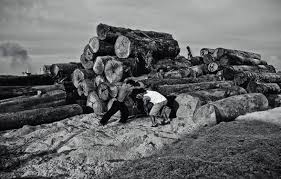Books & arts
文藝板塊
Book review
書評(píng)
The Peruvian Amazon
秘魯?shù)膩嗰R遜熱帶雨林
The wood from the trees
雨林困境
Wars of the Interior. By Joseph Zarate. Translated by Annie McDermott.
《林內(nèi)戰(zhàn)爭(zhēng)》。作者:約瑟夫·薩拉特。翻譯:安妮·麥克德莫特。
Osman Cunachi was practising free kicks one afternoon in 2016 when thick black oil from a crack in a nearby pipeline started oozing into the Chiriaco river. The 11-year-old member of the Awajun tribe, the second-largest indigenous nation in Peru, heard that government engineers were paying people to clean up the spill. His family was one of dozens who waded into the water with buckets and plastic bottles. Sick from the fumes, his four-year-old brother was the first to give up. Osman stayed in until it got dark, hoping to earn enough to buy a smartphone. In a photo taken that day he is covered in black smears, smiling and swinging his bucket.
2016年的一個(gè)下午,奧斯曼·庫納奇在練習(xí)任意球時(shí),稠密的黑油從附近一條輸油管道的裂縫中開始滲入奇里亞科河。11歲的奧斯曼是秘魯?shù)诙笸林褡錋wajun部落的成員,他聽說政府工程師正在花錢請(qǐng)人清理泄露的黑油。他的家人也加入了清理行列,一行幾十人拿著水桶和塑料瓶蹚進(jìn)奇里亞科河中。他四歲的弟弟因難耐黑油味而成為第一個(gè)放棄的人。奧斯曼一直呆到天黑,他希望掙到足夠的錢買一部智能手機(jī)。在當(dāng)天拍攝的一張照片中,渾身都是黑色污跡的奧斯曼微笑著搖晃水桶。

“It’s a perverse paradox of development that something as horrific as an oil spill and the death of a river could temporarily benefit a town,” writes Joseph Zarate, a Peruvian journalist, in “Wars of the Interior”. Each of his chapters investigates how a commodity extracted from the rainforest— wood, gold, oil—has changed the lives of the locals, mostly for the worse. Mr Zarate acknowledges that these industries have helped Peru and its Amazonian neighbours grow and modernise. But, he argues, too little thought has been given to the trade-offs. Rifts in Peruvian society over the exploitation of natural resources too often end in violence. A war is raging between “ clashing visions of progress” , and indigenous people are losing.
秘魯記者約瑟夫·扎拉特在《林內(nèi)戰(zhàn)爭(zhēng)》一書中寫道:“像石油泄漏和河流死亡這樣可怕的事情卻可能讓一個(gè)城鎮(zhèn)暫時(shí)受益,這是一個(gè)有悖常理的發(fā)展悖論。”他的每一章節(jié)都探討了取自雨林的一種商品(木材、黃金、石油)是如何改變當(dāng)?shù)厝说纳畹模渲写蠖鄶?shù)人的生活實(shí)際變得更糟。扎拉特承認(rèn),這些產(chǎn)業(yè)幫助秘魯及其亞馬遜鄰國(guó)實(shí)現(xiàn)了發(fā)展和現(xiàn)代化。但他認(rèn)為,當(dāng)?shù)卣跈?quán)衡方面考慮的太少了。秘魯社會(huì)在自然資源開發(fā)問題上的分歧往往以暴力收尾。一場(chǎng)戰(zhàn)爭(zhēng)正在“進(jìn)步愿景的沖突”間肆虐,而土著人民正在輸?shù)暨@場(chǎng)戰(zhàn)爭(zhēng)。
Many books about the Amazon cast its inhabitants as passive victims , or idealise them as guardians of the forest. Mr Zarate does neither. His subjects don’t oppose development itself — Osman’s father wants him to become a petroleum engineer — but rather the brutal way it has intruded on their lives. They are resilient and stubborn, but they are clearly outgunned. An Ashaninka chief sees no choice but to fight illegal loggers who are chopping down trees on his tribe’s reserve. He gets killed. A Quechua potato farmer can’t imagine selling her land for a pittance so that a mining company can dredge up a yellow metal of no value to her. Her house is burned down. Doctors find dangerous arsenic, lead and mercury in little Osman’s blood. He just wants to be “ a normal kid, and not be scared of getting a tumour one day”.
許多關(guān)于亞馬遜河流域的書籍將當(dāng)?shù)鼐用褚暈楸粍?dòng)受害者,或者把他們理想化為森林的守護(hù)者。扎拉特在自己的書中并沒有采取任意一種描述。他筆下的主人公們并不反對(duì)發(fā)展本身,(比如,奧斯曼的父親希望他成為一名石油工程師),他們反對(duì)的是發(fā)展對(duì)他們生活造成的殘酷影響。他們堅(jiān)韌而固執(zhí),但他們顯然是被打敗了。Ashaninka酋長(zhǎng)認(rèn)為,除了去懲罰那些在他的部落保護(hù)區(qū)砍樹的非法伐木者,他們別無選擇。結(jié)果他被殺害了。克丘亞部落的一名馬鈴薯種植戶怎么也沒想到,為了讓一家礦業(yè)公司挖掘一種對(duì)她毫無價(jià)值的黃色金屬,她會(huì)以微薄的價(jià)格賣掉自己的土地。結(jié)果她的房子被燒毀了。醫(yī)生在小奧斯曼的血液中發(fā)現(xiàn)了危險(xiǎn)的砷、鉛和汞。小奧斯曼只想成為“一個(gè)正常孩子,他并不害怕自己有一天會(huì)得腫瘤”。
譯文由可可原創(chuàng),僅供學(xué)習(xí)交流使用,未經(jīng)許可請(qǐng)勿轉(zhuǎn)載。











